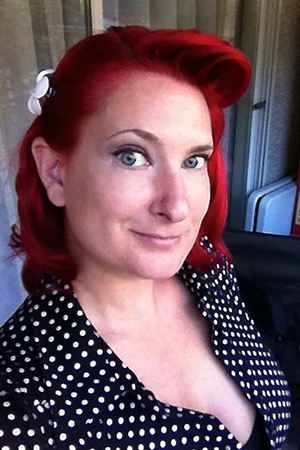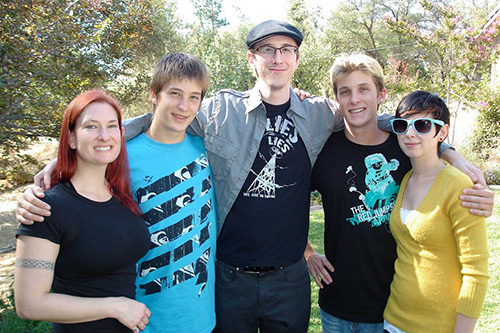“The Wrong Way”: An Interview with Sierra Skye Gemma
Sierra Skye Gemma won our 2012 Edna Staebler Personal Essay Contest for “The Wrong Way,” a trenchant critique of conventional grief theory using powerful family stories that enlighten and unnerve.
—Susan Scott
Working on an MFA at UBC and at PRISM International is a departure from where you started out. Or is it? What brings you to writing?

Writing is in my blood. My father was a writer. My brother Dane is a talented writer and so is his son, Devan. I started writing at age 12, although I didn’t think, “I’m going to be a writer when I grow up.” Not a one of my dad’s seven novels was published, so I didn’t see writing as a career. I’ve always had a very practical side, along with the drama and romance of being a dreamer. I thought I would be a high-school English teacher.
In the final years of high school, when I was writing angsty poetry, I entered my “best” poems in our state-wide writing contest and did not get as much as an honourable mention. I was devastated. I was also determined to win the following year, so I began to think seriously about how. I realized that the judges were probably parents, so I decided to write about the parent-child bond—in my own life, the very bond I was trying to escape; I had already moved to my older sister’s 3,000 miles away. Still, I had rich material from childhood to draw on.
When I was 8 and 9 years old, my parents were missionaries in the Bahamas. That meant no hot running water, television, radio, car, washer or dryer; most of what we ate, we caught or harvested, or baked ourselves. I became adept at catching land crabs. My father caught fish and lobster with a spear gun. My mother made our bread from scratch, in a large Folger’s Coffee can.
My submission to the state of Hawaii’s Language Arts Showcase, I decided, would be a poem about my mother. “Coffee Can Bread” began “I wanted to be just like you…,” and it took first place at both school and state level. I was ecstatic.
I was also disgusted with myself. I hated that poem. I hated the fact that all my real feelings—those angsty ones—meant nothing, yet I could write lies and people would love them. I didn’t write much after that until I was out and on my own.
After high school, I worked in Portland, Oregon as a barista and coffee shop manager, then as a staffing coordinator and unit secretary at a hospital. I paid my way through community college one class at a time; it took me 13 years to complete my B.A. In the meantime I got married, had a child, got divorced and remarried, moved to Canada, and so on. By the time I re-started my education at UBC, I knew I didn’t want to be a high school teacher.
Then one day I had an epiphany. “Nothing is going to make me a writer except me.” That realization freed me up to double major in history and sociology. In history, I learned how we’ve screwed things up (isn’t that how every great story begins?). In sociology, I learned how we’re dealing with those screw-ups (isn’t that how every great story ends?). I also learned how to write simply, clearly, and accessibly, how to organize my thoughts, and work within the confines of structure. After graduating, I took a Continuing Ed class in social media that required starting a blog. I started Vancouver Bites!, a food blog, and a funny thing happened: I remembered how much I loved writing.
Then came the summer of 2010 and The Dream.
It was unlike any dream I’d ever had. Setting: 1930s or 40s California, a dusty ranch or farm. I watched a family pushed to the breaking point by a world undergoing rapid change. Before my sleeping eyes, I saw betrayal, and my heart broke wide open—I awoke gasping. The next day, names, background stories, details came to me. I had to tell this story, not for myself, but for them.
I also wished I could talk to my mother, who had grown up on a California farm in the 1940s and 50s. We had not spoken in two years.
That night, emotionally drained by the dream, I collapsed in an armchair when the phone rang, and it was my mother. So began our conversation: I asked if I could talk to her about her childhood, and she talked for an hour and a half as I took notes.
The next day, I read my horoscope: “A dramatic dream had you tossing and turning. Now see how it applies to today’s agenda. Maybe your subconscious is trying to tell you something.” Exact quote, I kid you not. I cut it out of the paper and pinned it to the fridge, where it has stayed ever since. That day I decided to apply to UBC’s MFA Program and pursue a career in writing.
There was a sharp intake of breath around the table when TNQ editors read your essay. What’s happened since going public with these family stories?

You know, I don’t think about those things while I am writing. I just write. Even when I submitted the piece to TNQ, I didn’t think about the consequences, which was careless. That was a mistake. I didn’t start to realize it until I posted on Facebook that I had won the contest and tagged my nephews and niece because they were a big part of the essay; if it hadn’t been for them and our adventure, I wouldn’t have had that story to write.
My nephew Devan and his mother asked to read the essay. Suddenly it occurred to me that I had not just written my story, but theirs.
A part of me would like to say that next time I will think things through and consider the feelings of others—but, in all honesty, I’m not sure that is true. I have a need to write and, more than anything, I want to give in to that need.
As for others in the essay, almost everyone is estranged from me or dead. My mom died suddenly right after the piece was published. I had a chance to visit her, and we laughed and laughed, except when we cried. It was a great way to say goodbye.
It’s also strange to realize that every one of your ancestors is dead. Every single one. It’s lonely, but it is also freeing.
Let’s talk structure. You disrupt the family narrative with reportage about academic studies of grief, in effect limiting the reader’s exposure to powerful revelations that challenge those same studies. Why this construction?
The essay came together quickly: two weeks from idea to finished product, but part of that was due to the fact that I had already written certain parts, like the bit about the death of my son’s aquatic frog. I had also taken extensive notes when my sister was ill and after she passed away, so it was just a matter of fitting things together with exposition.
I also wanted to interject research. Originally, I had looked up the Five Stages of Grief model because I thought my experiences would correspond with the stages. Once I realized that I couldn’t relate my own life to this seminal work on grief, I knew my stories would be, instead, an argument against the whole mystic surrounding the Kübler-Ross theory.
And when your charming son Liam happens upon the essay one day down the road, how will that mother-son talk go?
Ha! It is going to be fine!
I’m a very open mother—a backlash, I guess, to my own closed upbringing. Even so, I never thought I was going to be a good parent. Why should I be? Maybe it was the knowledge that parenting wouldn’t come naturally—that I’d have to work hard at it—that saved me.
Two examples served me well, though. My nephews adored their mother despite her neglect and substance abuse. They loved her because she loved them. So, I knew that even if I screwed up, if I really loved my son, he would love me back. I also have open relationships with my nephews and nieces. So I was sure that if I were to be calm and honest whenever I transferred knowledge to my son, he would feel that openness and respond to it.
And that is exactly the kind of relationship we have. He can ask me anything and I will give him a calm, informed answer, to the best of my knowledge. Since he knows I won’t freak out, he has no fear in talking to me.
Of course, it gets more complicated the older he gets, but that’s OK; he doesn’t need to know that sometimes I am cringing on the inside when we talk. We have a home filled with humour, which helps. You can check out some of our discussions at www.liamsaysthis.tumblr.com.

